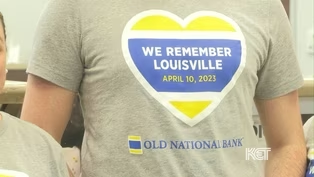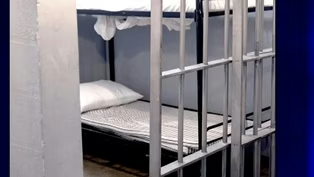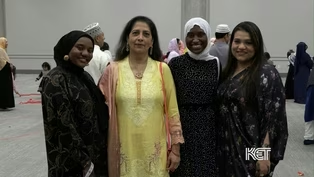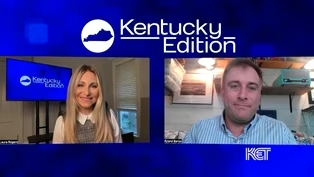
University of Kentucky Students Research Racially-Motivated Unsolved Murders in Kentucky
Clip: Season 2 Episode 225 | 4m 1sVideo has Closed Captions
University of Kentucky students research racially-motivated unsolved murders in Kentucky.
The Civil Rights and Restorative Justice clinic allows students to research cases with racially motivated violence that left Black Kentuckians dead, and let the people responsible go unpunished.
Problems playing video? | Closed Captioning Feedback
Problems playing video? | Closed Captioning Feedback
Kentucky Edition is a local public television program presented by KET

University of Kentucky Students Research Racially-Motivated Unsolved Murders in Kentucky
Clip: Season 2 Episode 225 | 4m 1sVideo has Closed Captions
The Civil Rights and Restorative Justice clinic allows students to research cases with racially motivated violence that left Black Kentuckians dead, and let the people responsible go unpunished.
Problems playing video? | Closed Captioning Feedback
How to Watch Kentucky Edition
Kentucky Edition is available to stream on pbs.org and the free PBS App, available on iPhone, Apple TV, Android TV, Android smartphones, Amazon Fire TV, Amazon Fire Tablet, Roku, Samsung Smart TV, and Vizio.
Providing Support for PBS.org
Learn Moreabout PBS online sponsorshipThe Jim Crow era made conditions worse for black people in the South and in Kentucky, it was no different.
Third year law students at the University of Kentucky are learning just how bad it was and what actions the justice system took to perpetuate and preserve racist ideas and practices.
The Civil Rights and Restorative Justice Clinic allows students to research cases with racially motivated violence that left black Kentuckians dead and let the people responsible go unpunished.
The project itself isn't developed exclusively here at Kentucky.
It actually has an origin at Northeastern School of Law.
Concept there is to investigate cold cases of racial violence and lynchings.
Throughout the Jim Crow era, throughout the South.
And as they've been moving up from the South and starting to touch what they refer to as border states, they've hit Kentucky.
And the idea was to try to talk to folks here on the ground here at UK law where we could now develop the project ourselves.
So the Civil Rights Restorative Justice program in Kentucky is a clinical program.
And so we define clinical program by opportunities where students are really getting to engage in real life work, right?
Whether it's representing clients, doing case research, etc..
But the work they're doing is not simulated, it's not hypothetical, right?
It's real world.
Right now I'm working on two kind of three cases and my role is kind of like I call myself like a cold case detective.
So we go through and look at archival materials.
So since this record's birth records, World War Two and one draft cards, stuff like that, to get a more full picture of who they were.
We've been working on these cases for, you know, seven, eight months.
You do sort of feel like you know them and that you have a connection with them.
And it can be hard knowing what happened to them in the end, because know, you'll find like marriage certificates or like birth of their children and then knowing how their life ends can be really hard.
We're investigating cold cases, but we're also looking for restorative justice for our victims.
We know what happened to them, and we know mostly the perpetrators are.
So we don't need to solve that part.
But we do need to figure out how to get justice for them.
For some of these people, like the people who killed them, had trials, but it wasn't fair, you know, because it's an element of bias.
But what we're finding in terms of the larger element of this violence is that it can be sort of interpersonal individual instances, but absolutely sort of state sanctioned.
But if it comes to police, violence is also kind of becoming a common ality as we're looking through it.
I think when we're investigating a lot of these cases, it's sometimes this alleged criminality was the being black in Kentucky.
It's about knowledge that we can't move forward and and people have trust in whatever systems and policy changes and whatever work we do if we don't actually acknowledge what the past truly was, people were hurt.
People were harmed.
That historical memory leaves scars, right?
Mentally, physically, on families, on communities.
So my hope is that what we are able to do is that when we're thinking about things like redlining and and looking at the way that law has been created, whether it's tax law or how we developed parks or whether how we're doing highways and whatever, that if this information and this knowledge goes into the minds of the people who are in charge of those things, if they have them in mind, they'll do better the next time, which is how.
The project was launched as a pilot program last fall.
But UK officials approved it as a clinical course at the law school.
Faculty says they hope to eventually create a database to house the cases and discuss Kentucky's civil rights violations.
Ceremony Held in Louisville on 1-year Anniversary of the Old National Bank Shooting
Video has Closed Captions
Clip: S2 Ep225 | 2m 10s | Ceremony held in Louisville on one-year anniversary of the Old National Bank shooting. (2m 10s)
Governor Andy Beshear Vetoes House Bill 5, Also Know as the Safer Kentucky Act
Video has Closed Captions
Clip: S2 Ep225 | 2m 36s | Governor Andy Beshear vetoes House Bill 5, the so-called Safer Kentucky Act. (2m 36s)
Muslims Across the Globe and in Kentucky Mark the End of Ramadan
Video has Closed Captions
Clip: S2 Ep225 | 3m 49s | Muslims across the globe and in Kentucky celebrate Eid, marking the end of Ramadan. (3m 49s)
Video has Closed Captions
Clip: S2 Ep225 | 6m 40s | Mid-Week Political Check-In (4/10/24). (6m 40s)
Providing Support for PBS.org
Learn Moreabout PBS online sponsorship
- News and Public Affairs

Top journalists deliver compelling original analysis of the hour's headlines.

- News and Public Affairs

FRONTLINE is investigative journalism that questions, explains and changes our world.












Support for PBS provided by:
Kentucky Edition is a local public television program presented by KET



